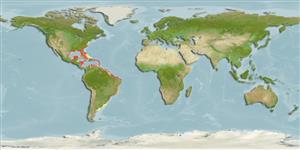>
Eupercaria/misc (Various families in series Eupercaria) >
Sparidae (Porgies)
Etymology: Archosargus: Greek, archo = anus + Latin , sargus = sea bream (Ref. 45335).
More on author: Linnaeus.
Environment: milieu / climate zone / depth range / distribution range
Ecologie
marien; brak water rifbewoner; diepte 1 - 40 m (Ref. 115835). Subtropical; 22°C - 30°C; 41°N - 58°S, 98°W - 34°W
Western Atlantic: New Jersey, USA and northeastern Gulf of Mexico to Argentina (Ref. 4517). Absent from the Bahamas (Ref. 26938).
Lengte bij maturiteit / Grootte / Gewicht / Leeftijd
Maturity: Lm 8.0 range ? - ? cm
Max length : 33.0 cm TL mannelijk / geslacht onbekend; (Ref. 7251); common length : 20.0 cm TL mannelijk / geslacht onbekend; (Ref. 9626); max. gepubliceerd gewicht: 550.00 g (Ref. 9626); max. gerapporteerde leeftijd: 2.00 Jaren (Ref. 3422)
Dorsale stekels (totaal): 13; Dorsale zachte stralen (totaal): 10-11; Anale stekels 3; Anale zachte stralen: 10 - 11. Large intestine makes up 90% of digestive tract and is twice the standard length, on the average; the stomach with 7 digestive caeca attached near the pyloric region. Pelvic fin coloration totally or partially dark in males; orange colored in females. Large dark spot (about same size as eye) below lateral line just behind gill opening (Ref. 26938).
Commonly found over mud bottoms in mangrove sloughs and on vegetated sand bottoms, sometimes in brackish water and occasionally also in coral reef areas near mangroves. Feeds on benthic invertebrates (small bivalves, crustaceans), as well as on plant material.
Robins, C.R. and G.C. Ray, 1986. A field guide to Atlantic coast fishes of North America. Houghton Mifflin Company, Boston, U.S.A. 354 p. (Ref. 7251)
Status op de Rode Lijst van het IUCN (Ref. 130435)
Gevaar voor de mens
Harmless
Gebruik door de mens
Visserij: commercieel
Meer informatie
ReferentiesAquacultuurAquacultuurprofielKweeklijnenGeneticaElectrophoresesErfelijkheidZiektesVerwerkingNutrientsMassaconversie
Tools
Speciale rapporten
Download XML
Internetbronnen
Estimates based on models
Preferred temperature (Ref.
123201): 22.8 - 28, mean 25.8 °C (based on 456 cells).
Fylogenetische diversiteitsindex (Ref.
82804): PD
50 = 0.6250 [Uniqueness, from 0.5 = low to 2.0 = high].
Bayesian length-weight: a=0.02042 (0.01730 - 0.02410), b=2.98 (2.94 - 3.02), in cm total length, based on LWR estimates for this species (Ref.
93245).
Trofisch niveau (Ref.
69278): 2.9 ±0.1 se; based on diet studies.
Weerstandsvermogen (Ref.
120179): Hoog, minimale populatieverdubbelingstijd minder dan 15 maanden (K=1.27; tm=0.4; tmax=2).
Fishing Vulnerability (Ref.
59153): Low vulnerability (23 of 100).
Climate Vulnerability (Ref.
125649): Moderate vulnerability (42 of 100).
Nutrients (Ref.
124155): Calcium = 67.7 [24.2, 130.8] mg/100g; Iron = 1.06 [0.47, 2.36] mg/100g; Protein = 20.3 [18.8, 21.8] %; Omega3 = 0.187 [0.084, 0.425] g/100g; Selenium = 24.2 [8.6, 62.8] μg/100g; VitaminA = 9.19 [1.53, 59.55] μg/100g; Zinc = 1.08 [0.60, 1.89] mg/100g (wet weight);
